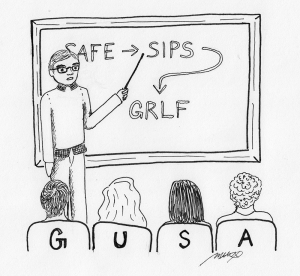 Prior to Monday, the presidential veto had not been exercised in the Georgetown University Student Association for three years. One would assume, then, given its rarity, that the veto is reserved for weighty matters in which all other alternatives have been exhausted.
Prior to Monday, the presidential veto had not been exercised in the Georgetown University Student Association for three years. One would assume, then, given its rarity, that the veto is reserved for weighty matters in which all other alternatives have been exhausted.
And yet that wasn’t the case Monday.
GUSA President Nate Tisa (SFS ’14) vetoed a bill regarding the Social Innovation Public Service fund’s management of the Green Revolving Loan Fund. The fund, mandated in January 2012 as part of the Student Activities Fee Endowment referendum, would use the considerable sum left over from $250,000 allocated by Georgetown Energy to install solar panels on university-owned townhouses. That money would be used by SIPS to distribute loans designed to promote sustainability. The bill presented by SIPS requested confirmation of its discretionary power to administer grants in addition to loans. SIPS, a fund that operates independently of GUSA, was shocked when after their bill passed the senate unanimously and with little debate, it was stamped with a veto.
Though it is certainly within Tisa’s authority to issue vetoes — and he maintains that he has no objections to quickly approving a revised bill — this veto remains objectionable. The problems he cited in justifying the veto had little to do with SIPS or the contents of the bill but rather the senate’s process of consideration. In defense of the veto, Tisa cites ambiguity of language and a general lack of knowledge in the senate as to the importance of SAFE reform legislation.
Many recently elected senators had not yet graduated high school at the time of SAFE reform. And given the importance of this topic, it is surprising that they have not received enough training to properly address it. Tisa may have been correct in raising concerns about the senate’s manner of consideration, but the time for transferring institutional memory should have been before the bill came to the floor, not after.
If Tisa believes that there is a need for institutional education, he should use his power as an executive to make sure there is a comprehensive instructive framework in place. Using a veto as a slap on the wrist to GUSA senators is counterproductive to the goal of this legislation: to allow an autonomous organization like SIPS to carry out its mandate.
SIPS was given autonomy and control over its green fund in large part to prevent this type of interference from GUSA. In fact, though SIPS was advised to go through GUSA, it remains unclear exactly how necessary it was to present the bill in the first place.
The parties involved will likely resolve this situation satisfactorily within the next several weeks. And though no permanent damage to SIPS is likely, the executive should exercise more caution with its veto in the future. It is misguided to punish SIPS for the failings of the senate.








